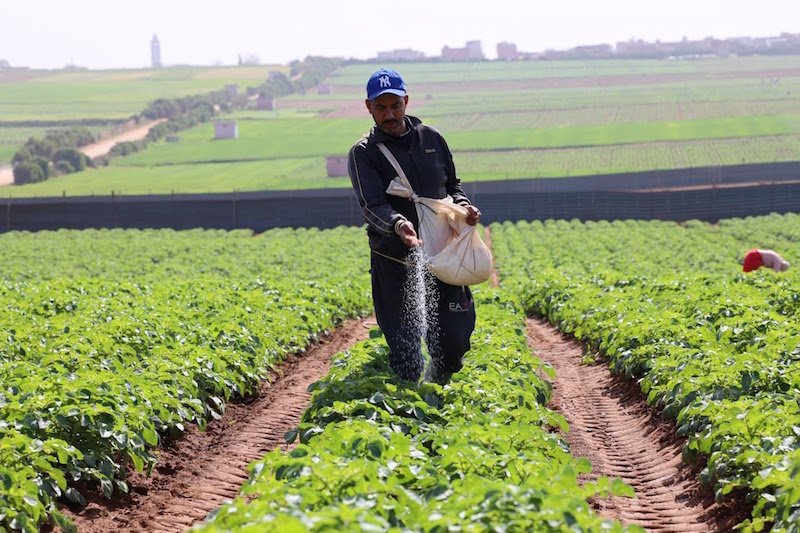As wheat and barley crops thrive and farmers begin planting a variety of vegetables, particularly potatoes and onions, many Moroccan farmers are eager to fertilize their fields with organic (animal-based) fertilizers at this time of year to boost their yields. However, this season, fertilizer prices have surged by MAD 500 to 700 per load, reaching as high as MAD3,500 in some areas.
Although the Ministry of Agriculture has made subsidized nitrogen-based fertilizers available to farmers and kept phosphate fertilizer prices stable, many farmers told Hespress AR they still feel compelled to buy natural organic fertilizers despite their soaring cost. They emphasized that the impact of organic fertilizers on soil quality simply can’t be matched by other types.
Farmers attributed the rising prices to a drop in production caused by fewer livestock in Morocco, combined with high demand, especially during this time of year. They pointed out that using “organic fertilizer serum (liquid solution)” could be a viable alternative to solid fertilizers, particularly for tertiary-type soil.
Hamid Khankoun, a farmer from the Kiko region in Boulemane, mentioned that the price of organic animal fertilizers has gone up this season compared to previous farming seasons, due to a decline in the production of these fertilizers, especially for crops like wheat, potatoes, carrots, and onions.
Khankoun, in a statement to Hespress AR, noted that the price per load has increased, ranging between MAD1,000 and 1,500, due to the decline, which is largely driven by the reduced number of livestock among farmers.
The farmer explained that in previous seasons when there was plenty of livestock, the price per load of animal fertilizer never went beyond MAD300 or 400 at most.
He added that “it’s necessary to use this type of fertilizer at the beginning of the vegetable planting season because it’s crucial for increasing the yield per hectare,” noting that “one hectare needs at least 10 loads of organic animal fertilizer to get the job done.”
As for replacing organic fertilizers with phosphate or nitrogen-based ones, which farmers receive in subsidized amounts, Khankoun explained that these alternatives “don’t have the same effectiveness as natural fertilizer, which keeps its nutrients in the soil for at least three seasons.”
In the Ain Karima farming area near Meknes, where farmers have started planting onions, the price of organic animal fertilizer has jumped from MAD700 per load in previous years to MAD1,500 this season, said Tarek Moumen, a farmer in the region.
He explained that “the decrease in livestock due to the drought, combined with the higher demand for fertilizer, is behind this price increase.”
Moumen added in a statement to Hespress AR that “onion farmers in the area need at least 3 loads per hectare, costing around MAD4,500.” He also noted that demand could continue to rise in the coming weeks, as many farmers have yet to start planting, still waiting for support from the Ministry of Agriculture for last season’s onion crops.
Riad Ouhitita, an accredited agricultural expert and consultant, confirmed, “there has been a significant rise in the price of organic fertilizer this season, with a single load now sold to farmers for MAD3,500—after previously ranging between MAD2,000 and 2,500 during past seasons.” He highlighted that “this increase affects many farming regions, including the West, Meknes, Fes, and Doukkala.”
Ouhitita attributed this rise to the high demand for dust from farmers during this time, as it poses no risk to crops and fruit trees in winter, unlike summer when fertilizing with it could harm both. He also pointed out that it is due to the decline in livestock numbers and the rising prices in the market.
The expert explained that “one hectare of fruit trees, grains, or potatoes usually needs around 30 tons of natural organic fertilizer at the start of the season, which is roughly one and a half loads.”
He also pointed out that “the increase in organic fertilizer prices applies to those made from poultry as well, even though they often end up causing more harm to crops.”
Ouhitita mentioned that “a significant number of farmers are using fertilizer serum, which is a water-based solution made from organic fertilizer (dust), passed through drip irrigation systems.”
He added that “this method, which doesn’t change the soil’s structure, can be more cost-effective than using solid organic fertilizer, especially in sandy soils. But in clay-heavy or sandy soils, you’ll still need to apply a substantial amount of solid fertilizer.”
The post Moroccan farmers complain about significant increases in organic fertilizer prices appeared first on HESPRESS English – Morocco News.





 No products in the cart.
No products in the cart.